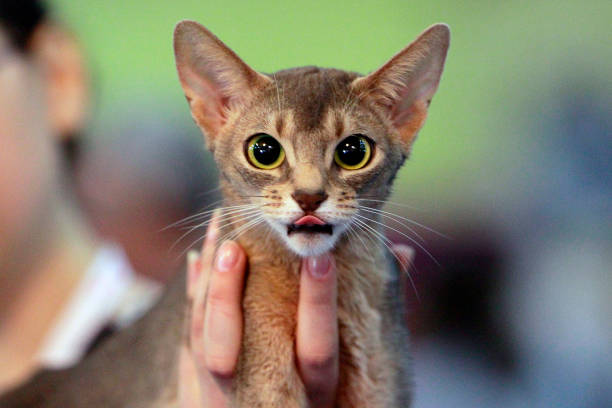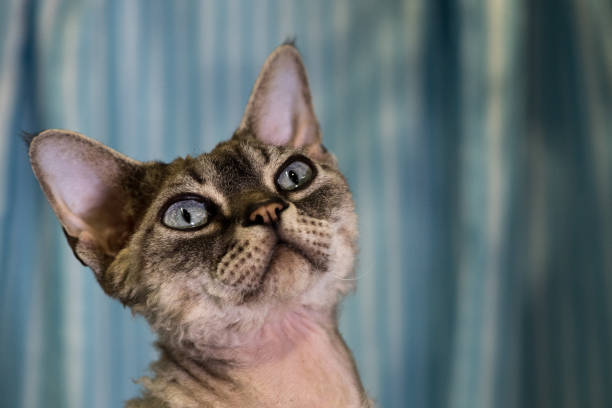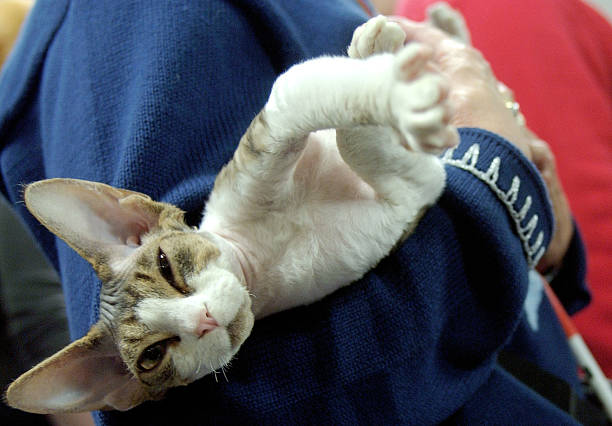Devon Rex: The Playful and Curly-Coated Marvel

History of the Devon Rex
The Devon Rex is a unique cat breed known for its short wavy coat, large eyes, and playful personality. Originating in Buckfastleigh, Devon, in the late 1950s, the breed began when Beryl Cox discovered the first known Devon Rex kitten, Kirlee. Kirlee's curly coat was the result of a spontaneous genetic mutation. Initially mistaken for a Cornish Rex, breeders soon realized this cat had a distinct mutation.
The Devon Rex breed quickly gained popularity in the United Kingdom and eventually reached the United States. Recognized by The Cat Fanciers' Association (CFA) in 1979, the breed is celebrated for its mischievous personality and affectionate nature.
Popularity of the Devon Rex
The Devon Rex's whimsical appearance, characterized by high cheekbones, oversized ears, and a unique coat, has made it a favorite among cat enthusiasts. Its playful personality appeals to families, singles, and seniors. Often seen in cat shows, the cat stands out for its lively behavior and striking look. Although popular, it remains relatively rare, making it a prized addition to any household. Its low-shedding, hypoallergenic cat coat is ideal for those with mild allergies.
Physical Traits of the Devon Rex
The Devon Rex is a small to medium-sized cat with distinct features that make it easily recognizable among rex breeds.
Key Features:
• Coat: The short coat is soft, wavy, and suede-like, coming in various colors and patterns.
• Size: Typically weighs between 5 to 10 pounds but is muscular and agile.
• Head & Expression: Wedge-shaped head, high cheekbones, short nose, large eyes, and oversized ears.
• Body: Slender, fine-boned with long legs, an arched back, and a curly-coated tail.
Personality Traits of the Devon Rex
Known for its affectionate and energetic nature, the Devon Rex is a true lap cat that thrives on human interaction.
Key Traits:
1. Affectionate: Forms strong bonds and loves cuddling.
2. Playful: Enjoys interactive games, climbing, and exploring.
3. Intelligent: Quick learner, enjoys puzzles and training.
4. Vocal: Uses chirps and meows to communicate.
5. Adaptable: Friendly with children, other cats, and dogs.

Why Choose a Devon Rex?
It combines a unique appearance with an engaging personality.
Reasons to Choose:
• Distinct Look: Curly coat, large ears, and elfin face.
• Social: Thrives on companionship.
• Energetic: Loves regular play and stimulation.
• Intelligent: Curious and quick to learn.
• Low-Shedding: Better for people with mild allergies.
Caring for Your Devon Rex
This breed requires specific care to maintain its health and coat.
Care Tips:
1. Grooming: Gentle brushing to remove loose hairs.
2. Bathing: Occasional baths to prevent oil buildup.
3. Exercise: Provide climbing structures and interactive toys.
4. Social Interaction: Needs companionship, should not be left alone for long periods.
5. Nutrition: Feed high-quality cat food to support health.
6. Health Monitoring: Regular vet checkups to detect potential health issues.
7. Temperature Sensitivity: Provide warm spots due to their thin coat.
Health Considerations
While generally healthy, the Devon Rex can be prone to certain health issues.
Common Issues:
• Hypertrophic Cardiomyopathy (HCM): Monitor through regular vet checkups.
• Patellar Luxation: Kneecap issues requiring attention.
• Hip Dysplasia: Occasional joint issues.
• Skin Conditions: Prone to rashes or irritation, manageable with proper care.
Comparisons to Other Breeds
The Devon Rex differs from Cornish Rex cats with its softer, looser waves and more mischievous personality. Unlike the hairless Sphynx, the Devon Rex has a soft, suede-like coat. Its playful, dog-like behavior sets it apart from more independent breeds.
Is the Devon Rex Right for You?
The Devon Rex is ideal for those who can provide attention, play, and companionship. Regular grooming and a balanced diet will keep your Devon Rex healthy and happy.
Ready to Welcome a Devon Rex?
United Pet Club is here to help you find your perfect feline companion. Whether adopting or connecting with breeders, we provide valuable resources to guide you. Explore our platform to learn more about Devon Rex cats and how to care for them. Contact United Pet Club today to start your journey with this playful and affectionate breed!

